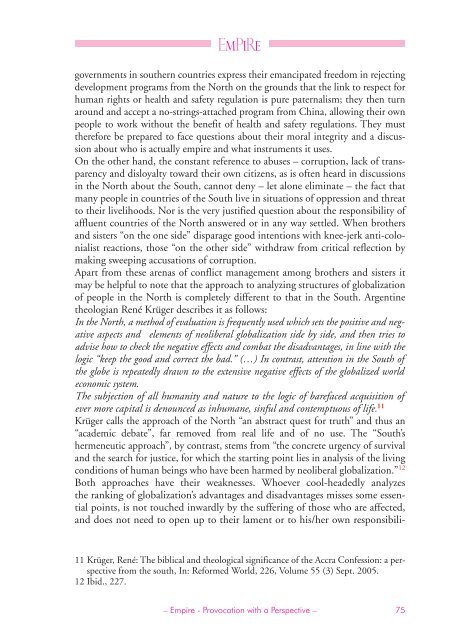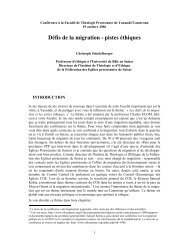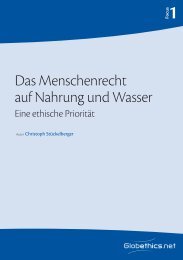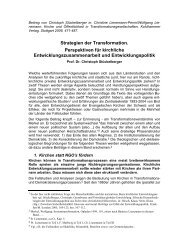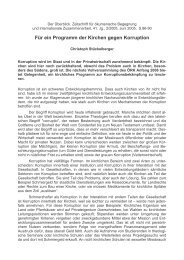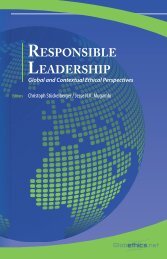BREAK THE CHAINS OF OPPRESION AND THE YOKE OF ...
BREAK THE CHAINS OF OPPRESION AND THE YOKE OF ...
BREAK THE CHAINS OF OPPRESION AND THE YOKE OF ...
Create successful ePaper yourself
Turn your PDF publications into a flip-book with our unique Google optimized e-Paper software.
governments in southern countries express their emancipated freedom in rejecting<br />
development programs from the North on the grounds that the link to respect for<br />
human rights or health and safety regulation is pure paternalism; they then turn<br />
around and accept a no-strings-attached program from China, allowing their own<br />
people to work without the benefit of health and safety regulations. They must<br />
therefore be prepared to face questions about their moral integrity and a discussion<br />
about who is actually empire and what instruments it uses.<br />
On the other hand, the constant reference to abuses – corruption, lack of transparency<br />
and disloyalty toward their own citizens, as is often heard in discussions<br />
in the North about the South, cannot deny – let alone eliminate – the fact that<br />
many people in countries of the South live in situations of oppression and threat<br />
to their livelihoods. Nor is the very justified question about the responsibility of<br />
affluent countries of the North answered or in any way settled. When brothers<br />
and sisters “on the one side” disparage good intentions with knee-jerk anti-colonialist<br />
reactions, those “on the other side” withdraw from critical reflection by<br />
making sweeping accusations of corruption.<br />
Apart from these arenas of conflict management among brothers and sisters it<br />
may be helpful to note that the approach to analyzing structures of globalization<br />
of people in the North is completely different to that in the South. Argentine<br />
theologian René Krüger describes it as follows:<br />
In the North, a method of evaluation is frequently used which sets the positive and negative<br />
aspects and elements of neoliberal globalization side by side, and then tries to<br />
advise how to check the negative effects and combat the disadvantages, in line with the<br />
logic “keep the good and correct the bad.” (…) In contrast, attention in the South of<br />
the globe is repeatedly drawn to the extensive negative effects of the globalized world<br />
economic system.<br />
EMpire � � � � �<br />
The subjection of all humanity and nature to the logic of barefaced acquisition of<br />
ever more capital is denounced as inhumane, sinful and contemptuous of life. 11<br />
Krüger calls the approach of the North “an abstract quest for truth” and thus an<br />
“academic debate”, far removed from real life and of no use. The “South’s<br />
hermeneutic approach”, by contrast, stems from “the concrete urgency of survival<br />
and the search for justice, for which the starting point lies in analysis of the living<br />
conditions of human beings who have been harmed by neoliberal globalization.” 12<br />
Both approaches have their weaknesses. Whoever cool-headedly analyzes<br />
the ranking of globalization’s advantages and disadvantages misses some essential<br />
points, is not touched inwardly by the suffering of those who are affected,<br />
and does not need to open up to their lament or to his/her own responsibili-<br />
11 Krüger, René: The biblical and theological significance of the Accra Confession: a perspective<br />
from the south, In: Reformed World, 226, Volume 55 (3) Sept. 2005.<br />
12 Ibid., 227.<br />
������������������������������������������<br />
� � � � � � �����������������<br />
�<br />
– Empire - Provocation with a Perspective – 75


